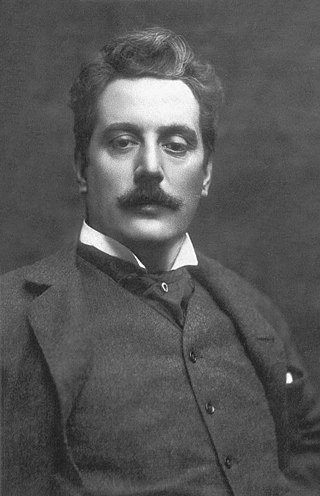
Giacomo Puccini was an Italian composer known primarily for his operas. Regarded as the greatest and most successful proponent of Italian opera after Verdi, he was descended from a long line of composers, stemming from the late-Baroque era. Though his early work was firmly rooted in traditional late-19th-century Romantic Italian opera, he later developed his work in the realistic verismo style, of which he became one of the leading exponents.

Tosca is an opera in three acts by Giacomo Puccini to an Italian libretto by Luigi Illica and Giuseppe Giacosa. It premiered at the Teatro Costanzi in Rome on 14 January 1900. The work, based on Victorien Sardou's 1887 French-language dramatic play, La Tosca, is a melodramatic piece set in Rome in June 1800, with the Kingdom of Naples's control of Rome threatened by Napoleon's invasion of Italy. It contains depictions of torture, murder, and suicide, as well as some of Puccini's best-known lyrical arias.

Turandot is an opera in three acts by Giacomo Puccini to a libretto in Italian by Giuseppe Adami and Renato Simoni. Puccini left the opera unfinished at the time of his death in 1924; it premiered in 1926 after the music was posthumously completed by Franco Alfano.
A tenor is a type of classical male singing voice whose vocal range lies between the countertenor and baritone voice types. It is the highest male chest voice type. Composers typically write music for this voice in the range from the second B below middle C to the G above middle C (i.e. B2 to G4) in choral music, and from the second B flat below middle C to the C above middle C (B♭2 to C5) in operatic music, but the range can extend at either end. Subtypes of tenor include the leggero tenor, lyric tenor, spinto tenor, dramatic tenor, heldentenor, and tenor buffo or spieltenor.

In opera, verismo, from vero, meaning 'true', was a post-Romantic operatic tradition associated with Italian composers such as Pietro Mascagni, Ruggero Leoncavallo, Umberto Giordano, Francesco Cilea and Giacomo Puccini.

Mario Lanza Live at the Hollywood Bowl: Historical Recordings is a 2000 CD, released by the Gala label, includes the six selections that tenor Mario Lanza sang at his first Hollywood Bowl concert on August 27, 1947. This is the performance that first brought Lanza to the attention of Hollywood, and shortly afterwards he was signed to a seven-year film contract with MGM. Included from the performance at the Bowl are six arias, three of them in duet with soprano Frances Yeend. Eugene Ormandy conducts the Hollywood Bowl Orchestra for these performances.

Alberto Franchetti was an Italian composer and racing driver, best known for the 1902 opera Germania.
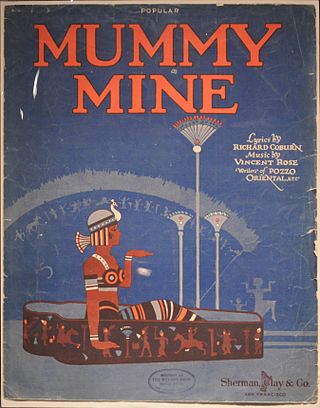
Vincent Rose(néVincenzo Cacioppo; 13 June 1880 Palermo, Italy – 20 May 1944 Rockville Centre, New York) was an Italian-born American violinist, pianist, composer, and bandleader.
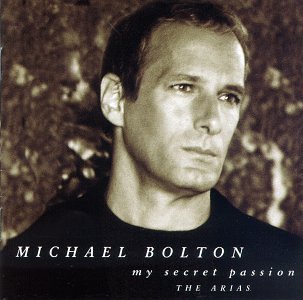
My Secret Passion: The Arias is the first classical album by Michael Bolton featuring the Philharmonia Orchestra under the direction of Steven Mercurio. The album includes a duet with Renée Fleming.
"Che gelida manina" is a tenor aria from the first act of Giacomo Puccini's opera, La bohème. The aria is sung by Rodolfo to Mimì when they first meet. In the aria he tells her of his life as a poet, and ends by asking her to tell him more about her life. It is one of the most recorded arias by tenors.
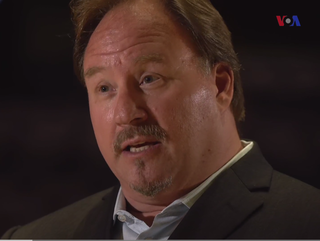
Carl Tanner is an American operatic tenor.

Wiesław Ochman is a Polish tenor.

Aria: The Opera Album is Italian tenor Andrea Bocelli's fourth studio album, released in April 1998.
This is a discography of Tosca, an opera by Giacomo Puccini. It premiered at the Teatro Costanzi in Rome on 14 January 1900. Tosca has been one of the most frequently recorded operas, dating back to a nearly complete acoustical recording in 1918.

"Avalon" is a 1920 popular song written by Al Jolson, Buddy DeSylva and Vincent Rose referencing Avalon, California. It was introduced by Jolson and interpolated in the musicals Sinbad and Bombo. Jolson's recording rose to number two on the charts in 1921. The song was possibly written by Rose, but Jolson's popularity as a performer allowed him to claim composer co-credit. Originally, only Rose and Jolson were credited, and DeSylva's name was added later.

Giuseppe Borgatti was an Italian dramatic tenor with an outstanding voice. The creator of the title role in Umberto Giordano's verismo opera Andrea Chénier, he subsequently earned renown for his performances of the music of Richard Wagner, becoming in 1904 the first Italian tenor to appear at the Bayreuth Festival. He sang a variety of leading roles at La Scala, Milan, from 1896 until 1914, but deteriorating eyesight caused by glaucoma put a premature end to his stage career, after which he turned successfully to teaching.

"Un bel dì, vedremo" is a soprano aria from the opera Madama Butterfly (1904) by Giacomo Puccini, set to a libretto by Luigi Illica and Giuseppe Giacosa. It is sung by Cio-Cio San (Butterfly) on stage with Suzuki, as she imagines the return of her absent love, Pinkerton. It is the most famous aria in Madama Butterfly, and one of the most popular pieces in the entire soprano repertoire.

Theodore Ritch was a Russian tenor. During the 1920s he was tenor of the Chicago Opera.
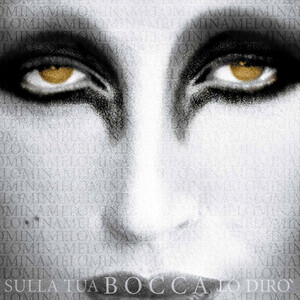
Sulla tua bocca lo dirò is a studio album by Italian singer Mina released on 20 February 2009 by PDU. The title of the album is taken from a line in the aria Nessun dorma Sulla tua bocca lo dirò fremente, ed il mio bacio scioglierà il silenzio che ti fa mia...
"O soave fanciulla" is a romantic duet from the first act of Giacomo Puccini's 1896 opera La bohème. It is sung as the closing number in act 1 by Rodolfo (tenor) and Mimì (soprano) where they realise they have fallen for each other.
















